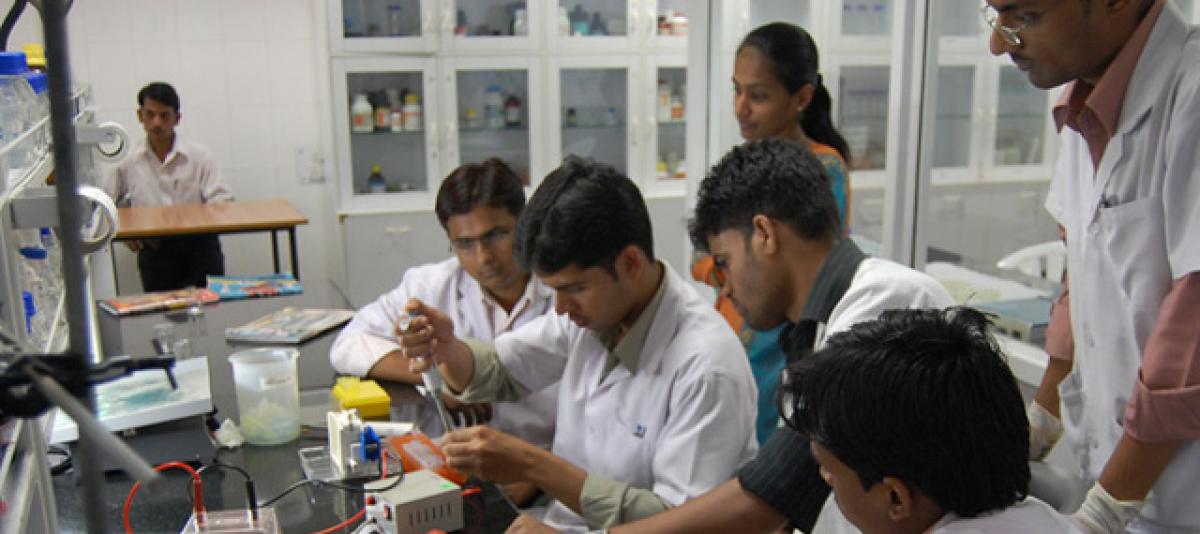Live
- Apple Removes WhatsApp and Threads from its Store in China; Details
- Amid flood of complaints, 50.96 pc turnout in Bengal's three LS seats till 1 pm
- BJP expecting its 'best show in South' on back of PM Modi's popularity, says HM Amit Shah
- Mahabubnagar MP Seat Witnesses Intense Competition among Congress, BJP, and BRS Candidates
- 150 Families from YSRCP Join TDP in Tanakallu Mandal
- Special prayers offered at Dargah during Keshineni Chinni's Nomination
- Dell launches AI-powered commercial PC portfolio in India
- Maha: 5 Vidarbha constituencies records 32.36 pc polling till 1 pm
- Congress, CPI-M not part of INDIA bloc in Bengal: Mamata Banerjee
- Madhubani Saree: The epitome of traditional elegance and modern beauty
Just In

Opinions vary among scientists. Opinions vary among scientists working in higher positions over the Union government’s decision to slash funds for scientific research in a phased manner. There are 39 Central research institutions in the country being funded through the Council of Scientific and Industrial Research (CSIR) by the Centre.
SLASHING FUNDS FOR RESEARCH
- Majority feel that focus on people-centric process will be deflected
- ‘If institutions depend on funds from captains of industries, they are required to follow the diktats of honchos’
Hyderabad: Opinions vary among scientists working in higher positions over the Union government’s decision to slash funds for scientific research in a phased manner. There are 39 Central research institutions in the country being funded through the Council of Scientific and Industrial Research (CSIR) by the Centre.
.jpg)
The funds are intended to help the institutions to carry out scientific and technological research in various segments. Every year about Rs 100 crore of funds are being released to these institutions by the CSIR. However, now the Centre has come up with a proposal to cut down by 10 per cent the funding every year, and to do away with the funding to these institutions at the end of 10 years period.
The Centre’s intention is to ensure that these institutions ramp up their revenue through research and development and become self-reliant. Now, while some scientists are questioning the business model asking to earn their own bread and butter, another section feels that it would help these institutions to do research and development of first order on a par with other scientific research being carried out across the globe.
Expressing displeasure over the move, Prof B N Reddy from Osmania University said, “The main objective of these institutions should be to focus on the priority sectors which would benefit the country in the long run. Some say that the move might shift the focus from the topic areas that the scientists work in these institutions keeping in view the requirements of the country during next 10 years from research that would generate money.
This would change the very priorities of the scientific research, they argue. Former CCMB Director and president of Indian Academy of Sciences, D Balasubrahmanian said, felt that Dehradun Declaration must be debated by the scientific community within CSIR, and by the larger scientific community before it is implemented.
Further, increasing temperatures due to global warming will have adverse impact on different crops in the country. So, developing seeds that could withstand the increasing temperatures should be the main focus. This kind of research would be adversely affected if the focus of the scientific community is shifted to revenue generation.
Striking a different note, and welcoming the move National Institute of Nutrition’s former director Dr B Sasi Kiran said the move “will motivate the scientist to develop new technology and the country will be benefited. You don’t have to put so much of money for basic running of the institution.”
However, disagreeing with Dr Sasi Kiran, former CCMB director, Dr Lalji Singh said “Funding institutes will dictate what kind of research the lab should do.” Taking a middle path, CSIR-Indian Institute of Chemical Technology (CSIR-IICT) Director Dr S Chandrasekhar feels they will earn from International Collaborations, Industries and local NGOs. It will take some time. The CSIR is self-sufficient and we don’t want to burden tax payers,” he said.
By V Naveen Kumar

© 2024 Hyderabad Media House Limited/The Hans India. All rights reserved. Powered by hocalwire.com







